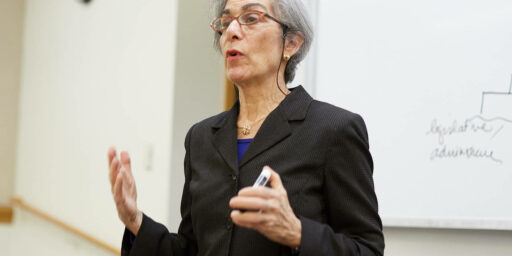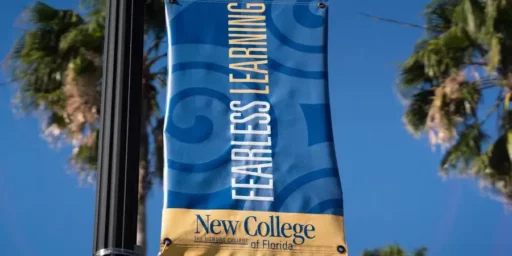Dan Patrick’s Response to the Texas A&M Faculty Suspension Controversy
His column in the Houston Chronicle fails to impress.

Back in July, I discussed (An Authoritarian Tale) the story of Joy Alonzo, a clinical assistant professor in the Department of Pharmacy Practice at Texas A&M University and an expert on the opioid crisis. She gave a guest lecture at the University of Texas Medical Branch in Galveston.* In so doing she is alleged to have said something (this is discussed below) that was critical of Texas Lieutenant Governor Dan Patrick, who, upon hearing of the slight, took it in stride as confident people in power must do from time to time called the Texas A&M system chancellor which sparked Alonzo’s suspension before she could get home to College Station from Galveston. Patrick has been roundly criticized for that move.
Now, he has responded via the Houston Chronicle: Exclusive: Dan Patrick breaks his silence on A&M professor (Opinion).
As a conservative public official whose actual words have often been ignored and distorted by opponents and the media, I understand the critical importance of free speech, both on college campuses and off. Academic freedom helps ensure Texas students are exposed to a range of ideas and learn how to critically evaluate and challenge those ideas.
Let me stop here and note that clearly, Patrick does not “understand the critical importance of free speech” else he would not have written this editorial, let alone have made the initial call. Someone who respects free speech and its “critical importance” would have received the phone call as he did about allegedly unkind things said about him, but instead would have moved on with his day doing nothing else. Instead, he used his power to intimidate.
Further, and this is the crux of this entire story, the most fundamental reason to have constitutionally protected free speech in a democracy is to allow for the criticism of public officials, especially about policy matters.
A side note: his attempt at martyrdom for being a “conservative public official” while clearly playing to his supporters, is rather irrelevant. All public persons have to deal with their “actual words” sometimes being “ignored” or “distorted.” This comes with the territory of being a public official, conservative or not. And it is doubly true for an elected official who should know that it is his responsibility to suffer the slings and arrows of public criticism. It is part of the job, especially in a democratic setting.
But “academic freedom” is not a shield for employees of state-funded universities to hide behind to escape any criticism of what they say and do. Many professors seem to believe they should have total control of all aspects of campus life, from curriculum to the hiring and firing of campus employees. They run off university presidents and chancellors who institute policies they don’t like.
This is, again, playing to his base and it is also a distortion of both academic freedom and how universities are run.
First, the scare quotes around academic freedom do a great job of demonstrating Patrick’s contempt for the concept (he does the same thing in the piece with the words faculty senate). Second, no one is saying that academic freedom allows one to “escape any criticism of what they say or do.” Indeed, academic freedom invites criticism, definitionally. We are not talking here about criticism. We are talking here about unjust punitive actions for an alleged one-sentence criticism of a state official by an expert in the field about which the criticism was levied.
Moreover, it is criticism (which I will get to below) that Patrick himself does not directly quote and only exists as an uncorroborated tweet (or whatever we call those things these days). Either Patrick knows that the alleged quote isn’t worth all of this or he wants the vagueness of it all to create a chilling effect since it will keep every professor in the state guessing and self-censoring (or, of course, both).
I would note that universities are run under processes of shared governance (albeit to varying degrees), and definitionally the faculty, as a collective entity (or, sub-collections within the whole) do, in fact, have a great deal of influence over things like hiring and curriculum. Although nobody has “total” control.** And it is ironic that Patrick wants to demonize hypothetical individual professors who are power-mad when the events that led to a professor being suspended under discussion here were the direct result of a handful of powerful individuals. Who is, it, I would ask in this context, that seems to think that “they should have total control of all aspects of campus life”? And, without adequate expertise, I would note.
I also find it ironic that a self-described “conservative public official” sure does love the notion that “state-funded” seems to mean to him “state-controlled” (and apparently, he is the state). Indeed, as I noted in passing in my original post on this topic, the student who reported the alleged slight in Patrick’s direction was acting like a Soviet political officer, tattling on the intelligentsia to the Party.
Over the past few weeks, I have sat quietly as a group of professors at Texas A&M have flailed away with overheated rhetoric about my supposed interference with their “academic freedom.”
First, of course, he sat quietly. He already did his damage behind the scenes and out of the spotlight because that is the way powerful people typically abuse their power. Out of sight and by contacting other powerful people.
In March, I received a call from a University of Texas Medical Branch student’s parent, Land Commissioner Dawn Buckingham, about a statement allegedly made about me by a visiting A&M professor in her daughter’s class. What was told to me wasn’t a criticism of policy. That is part of being an elected official and doesn’t bother me. However, if what I heard was correct, it was a false and inappropriate personal attack on me.
Let that sink in: he received a call about an alleged “inappropriate personal attack on me” and he thought that the appropriate course of action, instead of letting the criticism roll off his back, was to make a call to the systems Chancellor of Texas A&M to find out what lowly professor had had the temerity to say a mean thing about him in public. Also, this isn’t the parent of a sixth grader, this is the parent of a medical student who is, therefore an adult in her early-to-mid 20s. If she took exception to what the speaker said, ask the speaker about it; don’t call your mom.
Here’s the tweet with the alleged statement (from the link in the piece above):
First, I thought that the current line from conservatives to students is “Don’t be an easily offended snowflake” and that they should be willing to have their feeling hurt in a lecture. If hearing a single sentence about a politician one supports and then calling mommy (again, she’s a med student) isn’t quintessential snowflake behavior of the worst kind, I don’t know what is. Buckingham should have told her daughter to toughen up a bit, and likewise, Patrick should have ignored Buckingham, if not told her that he was able to take a critical sentence.
Second, it should be underscored that Buckingham shared the alleged quote after Patrick’s column was published, so Patrick himself never revealed the utterance that caused him to act. He was more than willing to let some vague standard exist to keep it unclear what the line is supposed to be so as to forestall any other professor from daring to criticize his majesty. It should be noted that for some reason it has taken months for anyone to be willing to assert what the offensive utterance was.
Third, we are dealing with a literal game of telephone here. This is Buckingham quoting something her daughter told her over the phone, which was the daughter’s recollection of what she thought she heard. The odds that this is a verbatim quote strike me as rather low.
Fourth, while I do not want to get into a parsing of what is almost certainly an incorrect quote, I am at a loss as to why, even if true, this would constitute a suspendable offense.
And, finally, fifth, the reporting does not corroborate the quote. The Texas Tribune, which has been truly excellent on this story, reports: Suspended Texas A&M professor denies saying Lt. Gov. Dan Patrick believes overdose victims “deserve to die”.
Buckingham declined multiple requests for comment before the Tribune published its initial story last week. University officials, Alonzo and Patrick have refused to specify what Alonzo was accused of saying during the March lecture.
In a statement provided by the university Wednesday, Alonzo responded, “A comment I made during a 2-hour lecture on March 7 regarding opioid overdose education and naloxone administration was mischaracterized and misconstrued. I’ve given this same presentation about 1,000 times across the state over the past few years, and I also have trained others to provide the same presentation. At no time did I say anyone deserved to die from an overdose.”
Buckingham did not hear Alonzo’s comments directly, but her daughter, who is a medical student at the University of Texas Medical Branch, attended Alonzo’s March lecture. Buckingham then alerted Patrick, who called Sharp and asked him to look into Alonzo’s comments.
I would add that the initial reporting by the Tribune on this matter could not find any students who could figure out what the offensive remark was meant to have been.
By the way, this is, well, a perverted view of this situation on a score of levels. From Patrick’s column:
Campus employees who coach sports understand what being held accountable means. A losing record will draw questions and criticism, often leading to their termination. Sports and academics are different, but all should be subject to a level of accountability.
How in the world a single alleged sentence is tantamount to a coach with a losing record being fired is well beyond me. I would hasten to add that if Patrick thinks professors should be paid like coaches, they might be willing to deal with the additional “accountability.”***
What followed is what concerns me the most. It is the ongoing outrage by the professors and their official “faculty senate” and, to some extent, the media. The A&M Faculty Senate has launched an investigation into, among other things, Texas A&M’s handling of Alonzo’s suspension. Their outrage seems based on the belief that anyone who dares ask a question about what is being taught or said in a classroom at a state university is somehow challenging their “academic freedom.”
Every student, parent, university booster, regent, chancellor, school president or legislator has the right to ask a question about campus conduct. Professors, who are largely funded by Texas taxpayers and students, are not above being held accountable.
I would note that accountability in the context of policy criticism, even a harsh one, is not the immediate suspension of the person who made the statement. If Patrick wanted to defend his honor, he could easily have had a press conference wherein he could have set the record straight, instead of making phone calls.
Also, having the faculty senate investigate this matter is wholly appropriate.
To add to this, let me turn back to the Tribune piece linked above:
Adam Steinbaugh, an attorney with the Foundation for Individual Rights and Expression, a nonprofit legal group focused on protecting free speech on college campuses, said Patrick is correct that faculty can be criticized but added, “This was not criticism.”
“This was a senior government official with his government chief of staff putting pressure on a university leader to look into one of his critics,” Steinbaugh said. “Faculty members have a First Amendment right to criticize policies and officials, and officials should not be leaning on university leaders to look into their critics.”
The Academic Freedom Alliance, a nonprofit dedicated to protecting the rights of faculty members at colleges and universities across the country, said in a letter last week that Texas A&M’s decision to act on Patrick’s request without any due diligence is problematic.
“Instead the university preferred to shoot first and ask questions later in order to mollify the sensibilities of powerful government officials,” said Keith Whittington, founding chair of the Academic Freedom Alliance. “Such actions are completely inconsistent with the principles of academic freedom that ought to be respected at a serious university, and they suggest that the university would prefer to sacrifice the constitutional rights of members of the faculty rather than risk angering state politicians.”
Indeed all around.
By the way, back to Patrick, he basically confesses that he is engaged in power politics with the state’s professoriate:
This isn’t the first time a “faculty senate” has pushed back at me for holding them accountable. Last year, the University of Texas Faculty Council bluntly stated they are not accountable to the Board of Regents (appointed by the governor) or the Legislature. They affirmed their belief that no one can question them on any matter. In short, their position is to tell taxpayers and students: Give us your money (billions of taxpayer dollars), then shut up and stay out of our business.
In response, I helped lead the Legislature to pass a tenure reform package (Senate Bill 18) addressing the guaranteed-for-life jobs many professors enjoy. We also passed legislation to stop the destructive and discriminatory diversity, equity and inclusion offices on Texas campuses (Senate Bill 17). It is important to remember that Texas A&M failed to include white and Asian men in a list of underrepresented minorities who could be hired using a special recruitment fund. A&M is now being sued over the policy, including the director of what was the DEI office.
So, note what he says: the faculty senate (again, note the scare quotes) acted in a way he didn’t like, so he responded by attacking tenure.
He concludes thusly:
In the real world, outside the boundaries of a university campus, everyone is accountable at some level to someone — whether it’s their customers, employer, employees or shareholders. Professors should be no different.
This is galling on so many levels.
First, I loathe the notion that university campuses aren’t “the real world.” While I fully acknowledge the privilege of working in higher education and understand the stereotypes of disconnected intellectuals living in their ivory towers. But, of course, that stereotype is typically used by politicians to denigrate knowledge and learning, because knowledge and learning undercut their power. If our words were not significant, people like Patrick would just ignore us. But moreover, higher education is a legitimate and complex industry like all the others across the land. It has its foibles, to be sure, and it is just as much the real world as anything else.
At a bare minimum, it is certainly the real world for people who fear for their livelihoods because Dan Patrick can pick up a phone and make an inquiry.
Second, despite tenure, professors are very much accountable. Despite the cartoonish view of tenure, professors can be fired for not doing their jobs (like anyone else). What tenure is supposed to do, however, is protect those who might speak truth to power. Further, I would note, that if one repeatedly speaks falsehoods, there are broader professional accountabilities that a given professor will then have to deal with.
But let me be clear: tenure is not an ironclad guarantee of employment. It just means that firing you is harder than it was before tenure (when you can be dismissed with notice without any reason being given). It is dishonest, however, to suggest that tenure means that faculty are unaccountable. This is simply not the case.
Let me sum all of this up as follows: the purpose of academic freedom, above all else, is to protect the relatively powerless from the powerful. And this story is very much about the powerful seeking to punish the less powerful because they have thin skin.
*Let me highlight, as I did in the comments of the original post, that Texas A&M is a wholly separate university system from the University of Texas. So these events boil down to a professor in one system being suspended for an alleged single comment while speaking to an audience of an entirely different university system.
**And look, do some professors have an outsized view of their options vis-a-vis how the university should be run? Of course! But that does obviate the reality that the faculty have limited power, even though they also have substantial input into some decisions.
***Jimbo Fisher, the head football coach at Texas A&M makes a base salary of $500,000/year and his total compensation for 2023 is reported to be over $ 9 million. If he is fired before his contract is up, his deal is guaranteed unless he is fired for cause (losing doesn’t count). If Patrick thinks this is “accountability” he needs to take a basic English class, which I am sure he could get online via Texas A&M if he is so inclined.






This is a straight up application of Wilhoit’s Law: “Conservatism consists of exactly one proposition, to wit: There must be in-groups whom the law protects but does not bind, alongside out-groups whom the law binds but does not protect.”
Patrick is protected by the law, but not bound by it. Alonzo is bound by the law, but not protected by it.
Setting everything else aside, even if you take Patrick’s word for what was said, you end up with him saying that “The policy you support is killing people” is not a criticism of policy, but is merely a personal attack. The usual next step is to focus on punishing those who leaked the details of his behavior…
Apparently getting a professor suspended is just asking questions now. It’s funny how those who profess to worry about the coercive power of the state love to exercise the coercive power of the state.
Apparently, conservatives are the most victimzed people in America, probably worse than slavery. And they are now determined to victimize the rest of America.
Texas: ancestral home to half of my family and currently the home to many of my siblings and many nieces and nephews …… as well as to superfund sites like Ted Cruz, Greg Abbott, Dan Patrick, Chip Roy, Troy Nehls, and Louie Gohmert.
Has FIRE gotten involved with this? As noted the First Amendment was very much meant to protect people who criticize political figures. This is about a brazen impingement on free speech as you can get.
Steve
This is just straight up authoritarianism.
It doesn’t come from the fascisto region of Italy and Germany, so it may just be sparkling authoritarianism rather than fascism, but it’s close enough that I am willing to call it the Texas Champagne of Fascism.
@steve: a FIRE attorney is quoted in the Tribune piece, but I am not sure what they have done apart from simply commenting.
@Gustopher:
Agreed. Indeed, I titled my initial post on this story, “An Authoritarian Tale.”
Republicans still railing about free speech and pretending to be against cancel culture, or nah?
The hypocrisy. It burns.
@DK: A) Every Republican accusation is a confession. B) They are unable to distinguish between polite society saying don’t use the N word and Patrick using the power of the state to punish a woman for criticizing the state. C) This is consistent with DeUseless’ idea that the University system is part of the governor’s administration, so the faculty are his subordinates. D) IIRC from discussions about W, Texas is set up so Patrick as Lt. Guv has way more power than Abbott as Guv.
@gVOR10:
“They are unable to distinguish between polite society saying the N word and Patrick using the power of the state to punish a woman for criticizing the state.”
They can distinguish them just fine. They just think that the first is acceptable, while the second depends on who is doing the criticizing of the state.
@gVOR10:
I would say rather that every Republican accusation is permission. From the Republican perspective, using their enemies tactics against them is not only fair and just. Since they believe they are defending the country against those trying to destroy it, it’s actually a moral good.
Liberals “cancel” those who say things they find objectionable so it’s okay if conservatives do the same.
Nevermind that many of the things they claim happened are false. It doesn’t matter that there are huge differences in any ‘equivalent’ they point to. That truly doesn’t matter. The important thing is that it gives them permission (within their own minds and to those in their ideological grouping) to do whatever they have accused their opponent of.
@Kari Q: False in whose perspective? We’re living in the age of facts and contrasting “alternative facts.”
@just nutha:
Yes, exactly my point. True or false, real or imaginary don’t matter. What’s important is the accusation gives them permission to do worse than what they accuse their perceived enemies of doing.
Patrick is the kind of politician you get when a party has controlled the entire state political establishment since last century. See also: Ken Paxton.
If Texas is anything like the states that I am familiar with, the people who fund the university are out of state students and their parents. State taxes pay less than 20% of the university costs.
The student has been getting some of the blame here for tattling and maybe she did. But maybe she was just talking to her mom and made an offhand comment that the good MAGA princess grabbed on to. Or given that she is a young person maybe she said it to tweek her parents nose a bit.
Could I just say in passing: a plaid shirt fine; a plaid shirt with a white collar?
Call the cops.
@BugManDan: This is a good point. These schools are really more accurately “state-supported” rather than state-funded. For that matter, a huge chunk of their funding is federal, either directly or indirectly through things like Pell grants
@JohnSF: That’s a faux-bespoke tailoring thing that became ubiquitous here for a while. Sorry to see it coming back ☹️